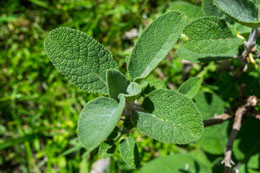The sage plant is a member of the mint family. It is a widely used culinary herb, which is also known for its healing properties. Find out some potential health benefits of this herb, through this Buzzle article.

Sage or
Salvia officinalis is a herb of the mint family, and is also known as the garden meadow. It is native to the Mediterranean regions, and has been used for thousands of years as a medicinal herb. For ancient Egyptians, it was the herb of fertility. The Latin word
salvia means 'to heal', which points to the fact that the medicinal properties of this herb has been known for a long time.
Benefits of Sage
Sage is one of the oldest herbs to be used by mankind for both culinary and medicinal purposes. For its peppery flavor and pleasant aroma, it is used for flavoring food. It also facilitates the digestion of fat- and protein-rich foods. Apart from these, it has been used for alleviating a number of health problems, like sprains, swelling, ulcers, bleeding, etc.
The main active chemicals found in sage oil are alpha and beta thujones, camphor, rosmarinic acid, tannins, flavonoids, and cineole. Much of the health benefits of this herb can be attributed to the presence of such active chemicals. Studies conducted in this regard have indicated that this herb may have antibacterial, antimicrobial, antifungal, and antiviral properties.
This herb also possesses astringent, stimulant, diuretic, expectorant, memory-boosting, antioxidant, and anti-inflammatory properties. Due to its anti-inflammatory properties, this herb can help cure cuts and wounds, sprains, ulcers, and joint pain. Being a good expectorant, it can help expel excess mucus from the respiratory tract. So, it can provide relief in conditions like cough and congestion. In addition to this, it is a herbal remedy for cold, flu, laryngitis, throat infections, sinusitis, and tonsillitis.
Even today, the tender branch of this plant is used in many parts of India as a herbal toothbrush. It cleans the oral cavity and teeth, and strengthens the gums, for which it is widely used in many herbal toothpastes. In European countries, this herb is used to prepare a gargle, that can soothe a sore throat and reduce inflammation of the mouth and gums. Sage is an ingredient in many natural mouthwashes. It is believed that the tannins found in this herb can help destroy bacteria.
Like rosemary, it is also known to boost memory by preventing the depletion of the neurotransmitter acetylcholine, which is required for the smooth operation of the brain functions. This herb is rich in flavonoids, which are known for their antioxidant properties. Flavonoids can protect your body from the harmful effects of the free radicals. Due to its astringent properties, sage can be used for conditions like loose or bleeding gums, excessive salivation, diarrhea, and excessive sweating.
This herb has estrogenic biochemicals, and so, it can be effective in relieving the symptoms of menopause, like night sweats, insomnia, headaches, dizziness, and palpitations. It is widely used for facilitating menstrual bleeding as well. This herb can also reduce the nervous excitement produced by brain diseases. Apart from these, this herb can stimulate appetite, and help alleviate liver disorders, typhoid, fever, haematemesis (vomiting blood), and paralysis.
However, this herb should not be taken internally by pregnant women, nursing mothers, and epileptic patients. Some concerns have also been expressed on the regular use of this herb, as it contains alpha and beta thujones. The ingestion of a large amount of these chemicals can cause convulsions, confusion, and a slight increase in heart rate. Therefore, it is advisable to talk to a health care provider or herbalist before taking this herb for medicinal purposes. However, the external use of this herb is quite safe, as no major side effects have been reported till now.
Disclaimer:
This Buzzle article is for informative purposes only, and should not be replaced for the advice of a medical professional.






 Sage or Salvia officinalis is a herb of the mint family, and is also known as the garden meadow. It is native to the Mediterranean regions, and has been used for thousands of years as a medicinal herb. For ancient Egyptians, it was the herb of fertility. The Latin word salvia means 'to heal', which points to the fact that the medicinal properties of this herb has been known for a long time.
Sage or Salvia officinalis is a herb of the mint family, and is also known as the garden meadow. It is native to the Mediterranean regions, and has been used for thousands of years as a medicinal herb. For ancient Egyptians, it was the herb of fertility. The Latin word salvia means 'to heal', which points to the fact that the medicinal properties of this herb has been known for a long time.